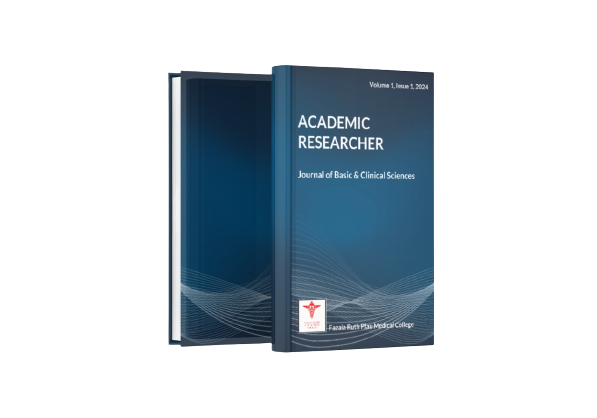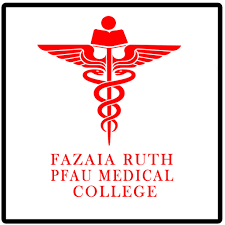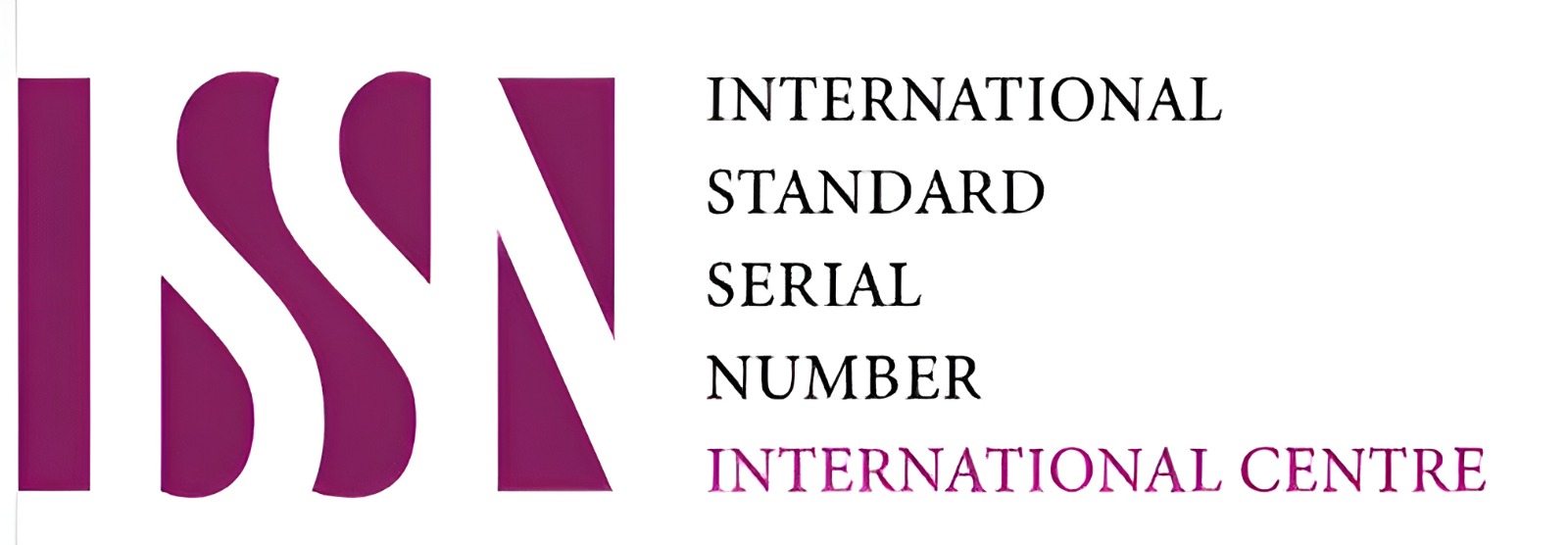

Academic Researcher
Journal of Basic and Clinical Sciences
Volume 03, Issue 01, 2026
An Official Journal of Fazaia Ruth Pfau Medical College, Air University
ISSN: 3008-0495 (Online)
ISSN: 3008-0487 (Print)
Policies
Open Access Policy
- Read, download, copy, and redistribute the published material
- Use the content for non-commercial purposes only
- Share the work in any medium or format, provided proper attribution is given to the author(s) and the journal
Academic Researcher: Journal of Basic and Clinical Sciences provides immediate open access to all published content. All articles are freely available online without subscription or registration barriers.
The journal publishes all articles under the Creative Commons Attribution-NonCommercial-NoDerivatives 4.0 International License (CC BY-NC-ND 4.0).
Under this license, users are permitted to:
The content may not be modified, adapted, translated, or used to create derivative works. Any commercial use or derivative use requires prior written permission from the publisher.
For any clarifications or queries regarding the usage, commercial or otherwise, of articles please message the following contact: editorial@frpmc.edu.pk
Copyright Policy
Authors submitting manuscripts to Academic Researcher: Journal of Basic and Clinical Sciences confirm that their work is original, has not been published previously, and is not under consideration elsewhere.
Copyright of all published articles remains with the author(s).
Upon acceptance, authors grant the journal a non-exclusive, worldwide license to publish, reproduce, distribute, and archive the work in all formats.
All articles are published under the Creative Commons Attribution-NonCommercial-NoDerivatives 4.0 International License (CC BY-NC-ND 4.0), which permits copying and redistribution of the material for non-commercial purposes with proper attribution and without modification.
The journal does not permit remixing, transforming, translating, or building upon the published content, in accordance with the terms of this license.
Authors are responsible for ensuring that all figures, images, maps, and tables - particularly those created using third-party software or platforms, comply with applicable copyright and licensing requirements. Where required, appropriate permissions must be obtained prior to submission.
If copyrighted material is published without the necessary permissions, the journal reserves the right to issue a correction, replacement, or retraction as appropriate.
Repository (Self-Archiving) Policy
Authors retain the right to deposit either the accepted manuscript or the published version of their article in personal, institutional, or non-commercial repositories.
Such deposition must comply with the Creative Commons Attribution-NonCommercial-NoDerivatives 4.0 International License (CC BY-NC-ND 4.0), which allows sharing for non-commercial purposes with proper attribution and without alteration of the published work.
Archiving Policy
Academic Researcher: Journal of Basic and Clinical Sciences ensures the long-term preservation and accessibility of all published content.
All articles and issues are securely archived on the institutional servers of Fazaia Ruth Pfau Medical College (FRPMC), with regular backups to safeguard against data loss. Published content is openly accessible through the journal’s official website and its Open Journal Systems (OJS) platform.
Peer Review Policy
Academic Researchers follows a double-blind peer review process. Each submission undergoes an initial editorial assessment to evaluate its relevance, originality, and adherence to journal guidelines. Manuscripts that pass the initial scrutiny are sent anonymously to two independent expert reviewers. Authors receive the reviewers’ comments and are required to revise their manuscripts accordingly. Revised submissions may undergo further review if needed before a final decision is made by the Chief Editor/Section Editor, based on the reviewers’ recommendations, scientific merit, ethical standards, and overall contribution to the field. All review reports are kept confidential, and reviewers are expected to declare any conflicts of interest and adhere to the ethical standards outlined by COPE.
Human Subjects Research
For research involving human subjects, authors must declare whether they conducted their experiments following the ethical standards outlined in the Declaration of Helsinki and Independent Data and Safety Monitoring Committee (IDMC). It is important to note that any information that could identify human subjects must not be used. Additionally, reports on experiments should indicate which institutional or national standards were followed. Authors must receive ethical clearance from the appropriate review board (such as an institutional, provincial, or national bioethics committee) before starting any study. In the manuscript, authors are required to provide the name of the ethical review committee and the approval or certificate number. Although the study may have been approved by the Ethical Review Committee, the editorial board or reviewers may still evaluate the article's ethical aspects.
Patient Consent/ Informed Consent
Researchers have a responsibility to protect the rights of study participants and not use them as a means to an end. To empower participants, researchers must obtain written informed consent unless a waiver has been granted by the Ethical Review Committee. The process of obtaining informed consent includes providing understandable information about the study's title, objectives, methodology, risks, benefits, and confidentiality, ensuring comprehension by participants, and allowing voluntary participation. In manuscripts, authors should state how informed consent was obtained from participants of different age groups, genders, and vulnerable populations. Informed consent must include study information, purpose, methodology, confidentiality, possible benefits/risks or discomforts, financial considerations, treatment alternatives, the right to refuse and withdraw, contact details, and an undertaking by the research participant.
In the case of mentally incapacitated patients, consent may be obtained from immediate relatives or legal guardians. In community-based studies, participants should agree without coercion or undue inducements. The Journal may ask for copies of informed consent. If it is impossible to obtain informed consent, the reason should be stated in the manuscript, and approval should be taken from the Ethical Review Committee. For more information, refer to the Declaration of Helsinki.
Research Involving Animals
Animal studies, whether involving lab-reared or non-lab-reared vertebrates or invertebrates, must conform to globally recognized animal welfare standards. Institutional Animal Care and Use Committee (IACUC) or its equivalent must approve animal studies, and authors must include this information in the methodology section, citing the approving body's name, certificate number, and issuance date. The Journal retains the right to request additional information regarding animal experiments, and authors should briefly describe the procedures and guidelines they followed regarding animal welfare. Manuscripts that suggest animals have been subjected to unnecessary or avoidable pain/distress will be rejected. Only essential experimentation on animals should occur when no alternatives exist. For more information, please review the International Association of Veterinary Editors' Consensus Author Guidelines on Animal Ethics and Welfare.
Authorship Changes
The sequence and list of authors must be confirmed at the time of submission. Changes to the author list after submission are generally not acceptable. The Editorial Office must be informed of any proposed changes during article processing, along with a reason and supporting evidence. A letter signed by all authors confirming their agreement to the change is required.
Authorship Criteria
- Authors must have substantially contributed to the research by participating in the conception, design, data acquisition, analysis, interpretation, or creating new software used in the work. They should have either drafted the work or made significant revisions to it.
- Authors must have approved the submitted version and any substantial modifications involving their contributions to the study.
- Authors are personally accountable for their contributions and must ensure that questions related to the work's accuracy or integrity are appropriately investigated, resolved, and documented in the literature.
- The journal encourages collaboration with colleagues at the research location, making them co- authors if they fulfill authorship criteria.
- Contributors who do not meet all authorship criteria should be acknowledged in the Acknowledgements section.
- Changes to the author list after submission, including the order, addition, or deletion of authors, must be approved by every author using a change of authorship form.
- Changes in authorship are not permitted after manuscript acceptance.
- All contributors who do not meet the criteria for authorship should be listed in an ‘Acknowledgements’ section. Examples of those who might be acknowledged include a person who provided purely technical help or writing assistance, or a department chair who provided only general support.
- All manuscripts must be submitted by an author and may not be submitted by a third.
Publication Misconduct
Any instances of publication misconduct will be addressed per the guidelines established by the Committee on Publication Ethics (COPE). Upon receipt of the available evidence, the corresponding author will be contacted and asked to provide an explanation. Depending on the severity of the misconduct, the article may be corrected or retracted. If the authors fail to respond satisfactorily or fail to respond at all, unpublished manuscripts will be dropped from consideration, and published manuscripts will be retracted. The retraction notice will be posted on the website and printed in the journal. In addition, authors who engage in publication misconduct may be blacklisted from further submissions to the journal, and their institutional head may be informed of the situation. Any form of publication misconduct, including plagiarism, fabrication (text or figures), falsification, a duplicate submission, redundant publication, selective and misleading reporting, and selective and misleading referencing, will be subject to strict action.
Plagiarism Policy
The Academic Researchers adheres to the guidelines/criteria established by ICMJE, PMC, and HEC for detecting all types of plagiarism, which can be accessed at www.icmje.org, www.pmc.gov.pk, and www.hec.gov.pk. All submitted manuscripts are checked for plagiarism using Turnitin software (courtesy of HEC), and those with a similarity index of more than 19% are not processed further unless rectified. Authors are responsible for detecting plagiarism in any form, including paraphrasing and self- plagiarism. Manuscripts submitted to the journal may be sent to HEC, other medical journal editors, and international agencies for authentication of originality. The Academic Researchers’ disciplinary committee, comprised of staff, editors, and the Chief Editor or his representative, will handle cases of plagiarism. For articles identified as plagiarized, the corresponding author will be required to provide an explanation upon request, and the article will be dropped from further processing/consideration of publication. If the author's response is unsatisfactory, the matter will be referred to the disciplinary committee, which will decide the course of action. In the case of published articles, the allegedly plagiarized article will be temporarily retracted from publication, and a notice will be published in the journal. The author will be asked to provide an explanation, and if there is no response within the given time or an unsatisfactory explanation is provided, the article will be permanently retracted, and the author will be blacklisted. HEC, PMC/PMDC, and the author's institution will be informed, and in the case of multiple submissions, other editors will also be notified. If an author claims intellectual/idea or data theft of an article, they must provide documentary proof to support their claim. If a defense of retraction from publication is pleaded, documentary evidence must be provided.
Privacy Policy
This website is owned and operated by the "Academic Researchers" Journal of Fazaia Ruth Pfau Medical College (FRPMC). The Journal is committed to maintaining confidence and trust with respect to the information it collects from its viewers/users. The names and email addresses entered in this journal site will be used exclusively for the stated purposes of this journal and will not be made available for any other purpose or to any other party.
Article Withdrawal
Articles in Press (articles that have been accepted for publication or published as E-pub Ahead of Schedule but which have not been formally published with volume/issue/page information) that include errors, or are determined to violate the publishing ethics guidelines such as multiple submission, fake claims of authorship, plagiarism, fraudulent use of data or the like, may be “Withdrawn” from the journal. Withdrawal means that the article files are removed and replaced with a PDF stating that the article has been withdrawn from the journal in accordance with Editorial Policies.
Corrections and Retractions
The journal encourages authors to notify the Editorial Office if they identify errors in published content, including authors’ names and affiliations, or if there are concerns regarding the legitimacy of a publication. In such cases, the journal will, in consultation with the Editor-in-Chief and authors, publish an Erratum or Corrigendum, or, if necessary, replace or retract the article. Corrections are classified as corrigenda (for author errors) or errata (for publisher errors).
Conflict of Interest
All individuals involved in the peer review process, including authors, editors and reviewers are required to declare any potential competing interests. Competing interests can be financial or non-financial, professional, or personal. Competing interests can arise in relationship to an institution, organization, or another person. Where authors have no competing interests, the statement should read “The author(s) declare(s) that they have no competing interests”. In cases where an undisclosed competing interest comes to light after publication, the journal will follow the guidelines set forth by the Committee on Publication Ethics (COPE). Failure to declare competing interests may halt the processing of the manuscript or may lead to the rejection of the manuscript depending on the clarification provided by the author.








